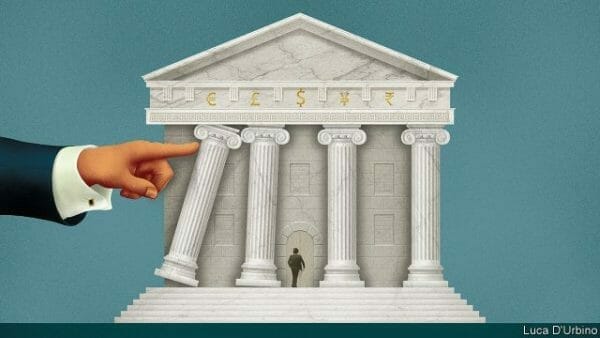The Bank of Canada has said that issuing a central bank digital currency (CBDC) isn’t in the cards right now, but they haven’t ruled it out for the future.
It’s not much of a surprise. Big historical shifts don’t happen by themselves. They need a catalyst to kick them off. The first world war had its assassination of Archduke Ferdinand, the second world war had the Treaty of Versailles to stoke the flames which gave rise to the nationalist fervour that led to the second world war. In a way, the political world revolves using Newtonian physical laws, and while we should be hesitant to think of the study of politics as a “science,” with all the baggage that word comes with, there are definite correlations.
Now let’s open with a question.
Could Libra be the catalyst required to get governments involved?
There’s always the rhetoric so popular with cryptocurrency advocates that widespread adoption exists as a direct challenge to the hegemony of the established order, which has an element of truth to it but is relatively overblown as most libertarian fanaticism tends to be. We’re forgetting that Bitcoin was the direct consequence of the depletion of confidence in the established order after the 2008 economic collapse. The housing crisis raised serious questions about the structural integrity of the global economic system, and while the sentiment wasn’t exactly incorrect, memories are notoriously short and it wasn’t long before the political winds shifted again.
But in the interim, Satoshi Nakamoto invented and introduced Bitcoin as a democratic electronically-funded to the existing monetary system, which was viewed as being decadent and corrupt. Hence, we have the private and public conflict played out online, between governments and the public sector. Except the Ayn Rand writ-large conflict never took place, because we live in reality and not a second-rate over-inflated pseudo-philosophical treatise from a half-banked Russian windbag with an understanding of how the world works informed by the gulag-era Soviet Union.

But let’s step away from the tinfoil hat crowd for a moment and look at this rationally. It’s sensible for a government to be conservative about its monetary source. That way they can save themselves the headache of the taxpayer cost of the rollout for a digital currency, including security, and all of the hidden costs associated with widespread global adoption and payments. Also, as a system, cash and its already mostly digital analog is working just fine, and there’s no reason to fix something if it isn’t broken.
There’s also the point that the democratic promise of Bitcoin can easily make the full-scale evolutionary jump into a plutocracy with the addition of a few bad actors. Bitcoin (and other decentralized currencies) aren’t going to see widespread acceptance, and any private monetary source is always going to be at loggerheads with established governments, because the privatization of money may not be in the public’s best interest.
Full stop.
There’s little that can be done to assail a privately held and decentralized coin, and there is a possibility that they could actually work as a check on government overreach and stupidity so they perform an actual democratic function. They lack direct control from any one entity, and require consensus to make any lasting changes to the protocol. That’s the beauty of it.
So the answer to the question posed much earlier in this article seems to be a resounding yes, but with attached conditions.
The government may not need its own cryptocurrency right now, but there are circumstances where that might change. It isn’t Bitcoin and other decentralized cryptocurrencies that we need worry ourselves about, instead it’s stablecoins that represent the real threat.
What companies are most likely to put out their own stablecoins? We already have the looming spectre of Facebook’s (FB.Q) Libra hanging over our heads, and Facebook isn’t exactly the most trustworthy of companies. What other companies can we expect, then? Alphabet (GOOG.Q), maybe?
In a speech, Timothy Lane, deputy governor of the Bank of Canada, laid out two scenarios by which Canada could be influenced to create its own digital currency:
One scenario would be if we ever reach the tipping point where cash could no longer be used for a sufficiently wide range of transactions.
That scenario would raise several potential concerns:
- payment services offered by large financial institutions could become the only game in town, giving them increased market power;
- people without adequate banking services would find it even more difficult to participate fully in the economy;
- people would lose the ability to conduct transactions privately; and
- the system could have a single point of failure, making it more vulnerable to computer system breakdowns and power outages.
The second scenario involved the widespread increase of private digital currencies, including one one dominant digital currency created by a big tech company. This monopoly would erode competition and privacy, and challenge Canadian monetary sovereignty. Basically, this would be everything that Satoshi Nakamoto said it would be, but instead of taking the power and control of monetary policy out of the hands of the entrenched and inept governments of the world and giving it to the people, it would effectively transfer control of monetary policy to the tech giants.
We would effectively enter into a dystopian nightmare wherein economic life is dominated by competing tech-companies. Imagine handing over the reins of power to the degenerate tribe of silicon valley knuckleheads spearheaded by the likes of Adam Neumann, Mark Zuckerberg or Masayoshi Son.
Here’s what Lane had to say:
If either scenario came to pass, society may be well-served with a digital currency:
- that is designed, issued and distributed by an organization that is guided by the interest of the public good, rather than profit;
- that is safe, resilient, universally accessible and private—just like cash; and
- that is backed by a central bank’s balance sheet and its reputation for preserving the value of our money.
Let’s hope that it doesn’t come to that.
—Joseph Morton

